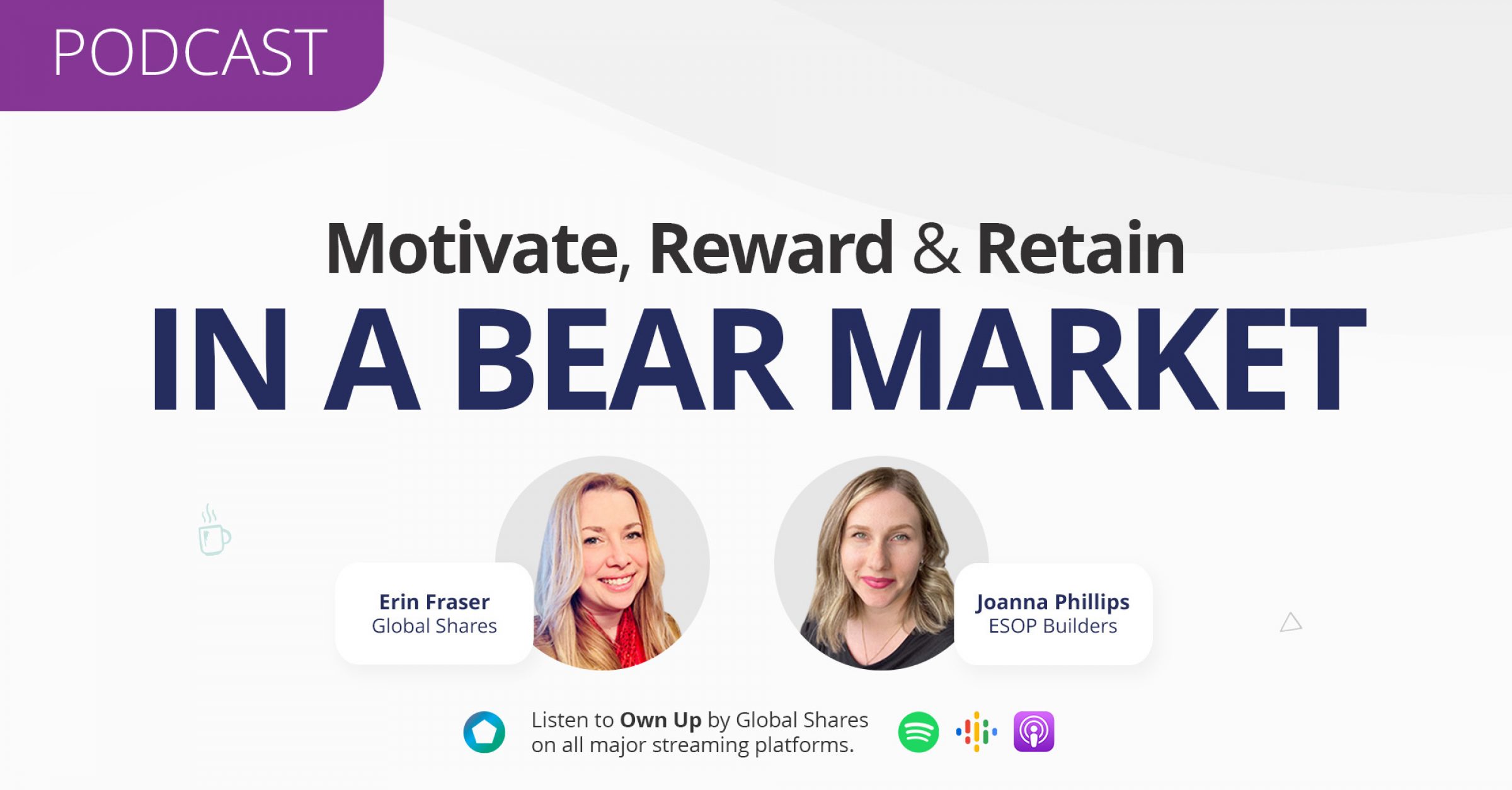A major event, like a merger, acquisition, buy-out, or IPO will have a massive impact on a company and its staff. It can be an exciting time but with so much to consider; employee equity rewards, legal requirements, cross-border equity transactions and managing shareholders’ expectations, could quickly become overwhelming, especially without proper assistance. That’s why seeking input from professionals, like Proxy Advisor Firms can be monumentally beneficial. They can do ’the legwork’ on a broad range of activities, provide strategic advice and give insights based on past experience. Remember, while this may be your company’s first time going through a major transition, it won’t be theirs.
Joining host John Bagdonas (senior vice president Business Development Global Shares) to discuss the nexus between proxy advisers and compensation strategy while offering insights for overcoming potential M&A challenges are Dexter John (CEO of Morrow Sodali Canada), a leading proxy adviser in the US and Canada, and Paul Gryglewicz (Global Governance Advisers (GGA)), who advises boards and senior management in the areas of executive compensation, human resource strategy and corporate governance.
As Dexter notes “when you have shareholders your ultimate goal is to increase shareholder value and a lot of these things eat into that because none of this stuff is free. You have to find a healthy balance. Issuers that don’t turn their minds to continuous engagement with their shareholder base, and contemplating the ESG matters that go along with it, you’re doomed to failure.”
Accelerated Vesting? Overhang? What are the options?
One such area is the question of what happens the private company’s equity plans and outstanding awards following a liquidity event. They discuss how an unprepared Board could find themselves with limited access to forms of equity, bringing limitations, including overhang or dilution and could risk running out of equity in the early stages of trading, forcing them to consider another form of retention award, like a phantom stock, or cash-settled solution issued outside of the approved equity plan.
“There are a couple of nuances that private company entrepreneurs should be mindful of as they introduce these types of plans in the first place,” says Paul, pointing out that not all private company equity plans will have the same options available. “That private company had likely been growing through different rounds of financing, hiring and now figuring out how to get key employees as excited as the founders, as inspired and eager about the upcoming event as they did when they were an early stage company.”
One option discussed is where any awards that have not yet vested become vested fully on the date of the IPO, what’s called an Accelerated Vesting Scenario. Another is where private equity groups don’t support accelerated vesting awards but prefer that the outstanding awards continue to vest in their normal course as a public company. The spirit of this arrangement is that the employees will continue to be retained as the company moves into being publicly traded.
“It’s equipping the new board to have a very big tool chest to be nimble as to how it structures its equity strategies as a public company. Even if it doesn’t want to use them it’s got shareholder approval as a newly traded company,” Paul explains, going on to talk about how an omnibus style equity plan could give access to the public company’s board to issue awards such as Stock Options, Restricted Stock Units, Performance Stock Units, Deferred Stock Units, or others (SARs, etc).
Forecasting Future Trends
IPOs, SPAC transactions and direct listings will go through trends depending on market turmoil. John asks what challenges Dexter and Paul have seen in the market for M&A activity post-pandemic and if there are any indications of more creative compensation plans being developed?
“A devalued market and hedge funds have a lot of influence on the Canadian market in particular,” Paul says of how economic slow-downs or non-co-operative markets can have an impact but can also provide advantageous for opportunistic hedge funds or activist funds who are biding their time. “The whole sector can bottom out, it opens up value based attacks from the activist world, where some activist campaigns can focus on equity compensation issues. Part of those issues can go into executive turnover.”
This in turn can influence the design and calibration of the criteria built into bonus programs.
In the US the Pay For Performance look-back table and gives transparency for the first time in the US so shareholders are going to have a multi-year lookback of pay and performance available to them. They speak about how it’s expected to have a huge impact with activist investors likely to use this immense amount of additional information to further bolster their activism points.
The recommendation from both Dexter and Paul is to seek good advice and talk these issues through noting that ISS or Glass Lewis will have influence on a company’s Annual General Meeting but each company will need to understand what type of clause might be best for their organization, based on size and the market they trade in.
Internal Guidelines Vs Glass Lewis and ISS Recommendations
“What you’re finding now is that institutions have their own internal guidelines that they will review. So they’ll take the Glass Lewis or ISS recommendation, and review it against their own policies and sometimes come up with something completely different,“ Dexter says of how the environment around M&As have evolved.
As the issuer you first need to understand who are the audience you need to cater for to ensure this deal goes through.
Dexter John, Morrow Sodali Canada

“If you’re highly retail then ISS or Glass Lewis will not really matter as much, but then you have to ensure you sell the transaction to your shareholder base, whether it be transformational or otherwise. You’ll cater your messaging to that.”
He stresses the importance of having a good relationship with the governance areas of these institutions and an understanding of your own internal policies and guidelines.
Dexter stresses that Governance and ESG elements are becoming more important, so recommends that companies understand who their shareholder base is comprised of and what it is that they’re trying to achieve by taking this transaction pass.
“Board renewal is something to always be thinking of and be conscious about,“ he says. “We live in a day and age where historically boards were comprised of white males. There was less gender parity, racial parity. These are things now that are being contemplated and addressed so that’s something boards, from the governance side, need to consider.”
He recommends looking at the deal in terms of what’s the market’s likely reaction, and identifying any duplication, redundancies or synergies. He also stresses the importance of ensuring companies use the correct policies, especially if operating outside of one geographic territory.
Dexter concludes by noting “the appeals process to an ISS or a Glass Lewis is limited in time because ultimately unless you can show facts that they’ve gotten incorrect they won’t usually bend and therefore you have to go back to your institutional shareholder base and have that conversation. What we are seeing now is large institutional shareholders having their own internal guidelines which may be more progressive than an ISS or a Glass Lewis or they may not be, but they are recognising that they have their own guidelines and they’ll follow that over the advice of a third party proxy advisory firm.”
Cross-Border Transactions
Cross-border transactions come with their own unique set of challenges. Companies starting to grow into multiple regions will need to address not only the new size of the company, but local factors like wages or the cost-of-living in different areas, along with the effect of employees either leaving or remaining, and possibly feeling disgruntled about the potential impact of any windfalls they or others may or may not receive following the transaction. All of which is before you even consider the complex and heavy administrative burden that comes with it.
“Companies need to be organised because the buying firm is going to need to know all these arrangements and contract deals, because it goes into the detail of the closing of the deal,” Paul says. “Products like Global Shares is a platform that allows a company to be very well organized with their equity plan details, and their Cap Table and to share it very efficiently, with a suitor or an acquiring firm, because you do need that technology support in today’s world where you see so many employees receiving long term incentive or equity arrangements.”
“We work with the board and the shareholders and highlight the challenges in terms of structuring the deal. The differences between countries are large. Every aspect from compensation to HR to Board structure all need to be contemplated and discussed and make sure that you find the happy medium that will get this deal approved by the third party proxy advisers.” Dexter says of how companies can try to ensure any deal is consummated smoothly.
The example is given of a Canadian company acquiring a US firm, where it’s not uncommon to see a smaller company in the United States already paying higher compensation and wages throughout the organization. This creates internal compression in the new parent with certain employees possibly earning more than those they report to. Decompressing the hierarchical structure and deciding what philosophy to adopt for dealing with it as they start to build one overarching company strategy therefore becomes a very real issues for Boards.
As the conversation veers towards approving clawback regulations and the risk of incorrect historic data it’s clear this is a far reaching subject.
Preparation Is Key
Along with the importance of being organized, another item they stress throughout the webinar is the need to acknowledge that there’s also a resource and time commitment cost to any decision made.
“Be prepared before something happens. Try to make sure that your information is centralized and you have an understanding of all the arrangements that are out there and that you’ve done along the way, “ is Paul’s advice.
As any deal evolves information not previously considered may need to be contemplated and it’s important to have all the relevant parties onside and informed.
“Gone are the days where you didn’t communicate with your top shareholders until a month before your AGM, got their vote, moved on and didn’t talk to them for another eleven months. Now ESG Governance requires interactions at all times with these people and understanding what their touch points are, ” Dexter explains stressing how important it is for a private company to be fully prepared for the work that goes into finally hitting a liquidity destiny, like an IPO or M&A.
Please Note: This publication contains general information only and Global Shares is not, through this article, issuing any advice, be it legal, financial, tax-related, business-related, professional or other. The Global Shares Academy is not a substitute for professional advice and should not be used as such. Global Shares does not assume any liability for reliance on the information provided herein.








